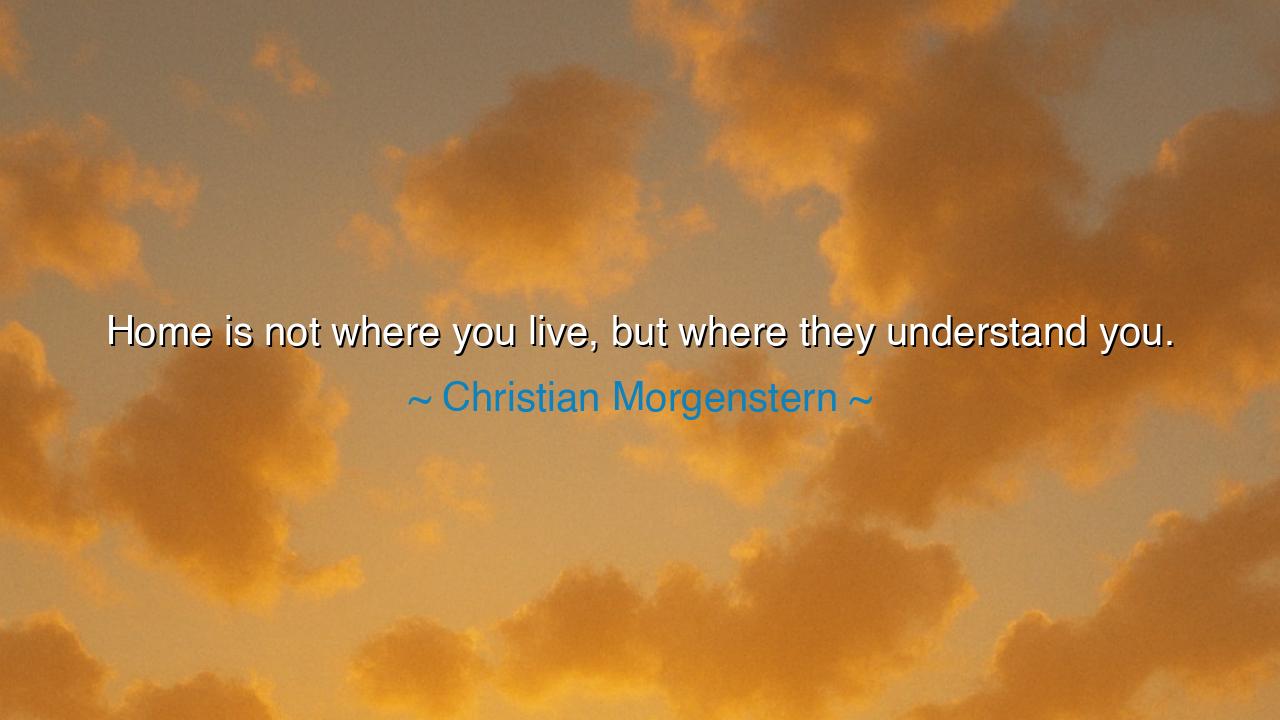
Home is not where you live, but where they understand you.






The words of Christian Morgenstern — “Home is not where you live, but where they understand you.” — descend like a whisper from the heart of all who have ever wandered, searching not for shelter, but for belonging. They speak not of roofs and walls, nor of land or lineage, but of that unseen sanctuary where the soul is known and accepted. Morgenstern, a poet of the German spirit, looked beyond the material definitions of life; he saw that true home is not a place upon the earth, but a condition of the heart — the meeting of one soul with another in mutual understanding. In these few words, he distilled what many discover only through years of longing: that to be truly at home is not to dwell in comfort, but to dwell in connection.
Christian Morgenstern lived in the late nineteenth and early twentieth centuries, a time when Europe was rapidly modernizing, when men and women were uprooted from their traditions and scattered by progress. He was a poet, a humorist, and a philosopher — one who believed in the union of spirit and art. His own life was marked by frailty and introspection; often in poor health, he wrestled with the tension between solitude and companionship. Out of that struggle arose this profound insight — that one may live in a house and yet feel exiled, while another may walk among strangers and feel at home if even one soul truly understands them. Thus, the origin of his quote lies not in architecture or geography, but in the eternal human yearning to be seen, heard, and known.
To understand the meaning of his words, one must first look inward. The world teaches us to measure home by property, wealth, and stability, but the heart measures it by understanding. A house may protect the body, but only understanding protects the spirit. You may live in palaces and yet ache with loneliness, or you may rest in a humble dwelling and feel rich beyond measure because those around you speak the unspoken language of your soul. In truth, home is not a place you find on a map, but a warmth you feel in another’s presence — where judgment fades, and authenticity blooms.
History, too, bears witness to this truth. Consider the story of Anne Frank, the young girl who hid from persecution in a secret annex in Amsterdam. Though confined by fear and war, she wrote not only of sorrow, but of faith — faith in humanity, and in the hope of being understood. Her diary was her voice reaching out through time, and though her body perished, her spirit found its home in the hearts of millions who read her words and understood her. She never found a homeland of safety in life, yet in death, she found a home in understanding — the only home that endures beyond walls and borders.
Likewise, the wandering philosophers and poets — from Diogenes in his barrel to Rumi wandering the deserts — all knew this truth. They were citizens of the world, often estranged from their societies, yet they found belonging in those rare hearts that recognized them. When Rumi met Shams of Tabriz, he said that in that friendship, his soul had found its home. So too, Morgenstern’s words remind us that one true understanding between souls outweighs the comfort of a thousand houses. For the spirit craves communion more deeply than possession.
This quote also teaches humility and compassion. It reminds us that to make others feel at home, we must first learn to understand them. To listen, not merely to words, but to silences; to see, not only faces, but feelings. Many wander not because they have no house, but because they have no one who truly understands their heart. The greatest gift you can offer another is not wealth or shelter, but empathy — to make them feel that they, too, belong. This is how a world divided by difference may begin to heal: when understanding becomes the foundation upon which humanity builds its home.
Therefore, my children, let this be your lesson: seek the home that cannot be taken from you — the home of mutual understanding. When you find those who truly see you, cherish them, for they are the pillars of your inner sanctuary. And strive to be that home for others — a safe place for their truth, a listener to their silence, a light to their loneliness. For houses may crumble and lands may change, but the home of the heart endures beyond all time. As Christian Morgenstern teaches, to be understood is to belong, and to belong is to live in peace. And so, wherever understanding dwells — there, at last, you are home.






AAdministratorAdministrator
Welcome, honored guests. Please leave a comment, we will respond soon